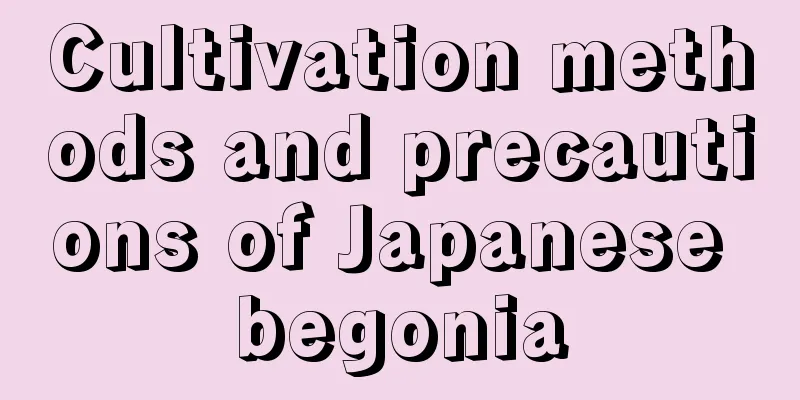Cultivation methods and precautions of Japanese begonia

1. Breeding methods(1) Soil: Acidic or neutral soil is best for cultivation. Its composition can be a mixture of river sand, leaf mold and sawdust. Nutrient soil made of leaf mold, field soil and sand in a ratio of 5:3:2 is also acceptable. Be careful not to use saline-alkali soil and clay soil, otherwise it will lead to poor growth. (2) Temperature: Its optimal growth temperature is between 18 and 20 degrees Celsius. Since it is relatively cold-resistant, it can be placed outdoors as long as the room temperature is not lower than 10 degrees Celsius. (3) Sunlight: It is a plant that prefers sunlight and is suitable to be placed in a sunny place with good light and ventilation. If it is placed in a cool, dark place for a long time, its growth will be hindered, so make sure it has enough light time. (4) Watering: Water as little as possible during the germination period. Increase the amount of watering during the growth period, and water twice a day. Be careful when watering, do not pour water on the stems and leaves, and water slowly along the edge of the pot, otherwise water will accumulate in the stems and leaves, which will easily cause rot. (5) Fertilization: Normally, it does not require fertilizer, but in autumn, when the begonia leaves fall, a large amount of nutrients will be lost, so a large amount of fertilizer should be applied to replenish nutrients. In early spring, you need to apply fertilizer once and water thoroughly once, which will allow the fertilizer to fully penetrate the soil. 2. NotesAfter its leaves fall and before it sprouts in spring, it needs to be carefully pruned to remove dead branches, diseased branches and weak branches to increase its light transmittance and ventilation. If you want to increase the number of flower buds, you need to shorten the long branches so that other axillary buds can obtain more nutrients. You also need to pinch them in time to prevent the nutrients from being dispersed. |
<<: Cultivation methods and precautions of money tree
>>: How to propagate green radish
Recommend
Desert Rose Pruning Methods
The hot season is the peak season for the growth ...
Things to note when transplanting bougainvillea: transplanting methods and management matters
After growing for 2-3 years, the bougainvillea pl...
Maintenance method of tortoise shell dragon
Maintenance methods soil The soil used to plant t...
What's the matter with the white frost on the leaves of Impatiens? What should I do?
1. What is the reason for the white frost on the ...
Can Strelitzia be grown hydroponically?
Can Strelitzia be grown hydroponically? Strelitzi...
What kind of plant is Ginkgo? What kind of plant is Ginkgo
1. Plant introduction Ginkgo is a deciduous tree ...
What is the plant of naked capsule?
1. Leaves The leaves of the naked capsule are sin...
Efficacy and function of spiromicin
Abamectin is a compound insecticide that combines...
Can pepper spray kill insects?
1. Can kill insects Because chili and pepper have...
What to do if the leaves of hydroponic white palm turn yellow
1. Sudden changes in the environment Reason: The ...
How to grow cucumbers to achieve high yield?
Cucumber, as a common vegetable , occupies an imp...
Do lemon trees like water or drought?
Do lemon trees prefer moisture or drought? Lemon ...
How to care for and prune pansies after they bloom
1. Reasonable topdressing The flowering of pansie...
Where does the dragon fruit grow? What plant does the dragon fruit grow from?
Dragon fruit is divided into red-heart and white-...
The tips of avocado leaves are burning yellow. How to save avocado seedlings if their leaves wilt?
1. The temperature is too high Avocado is afraid ...









